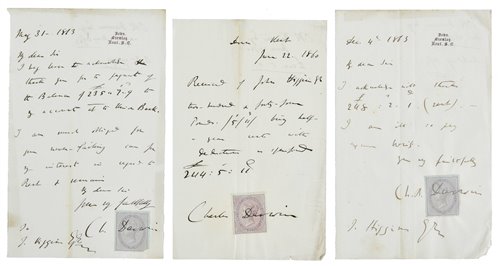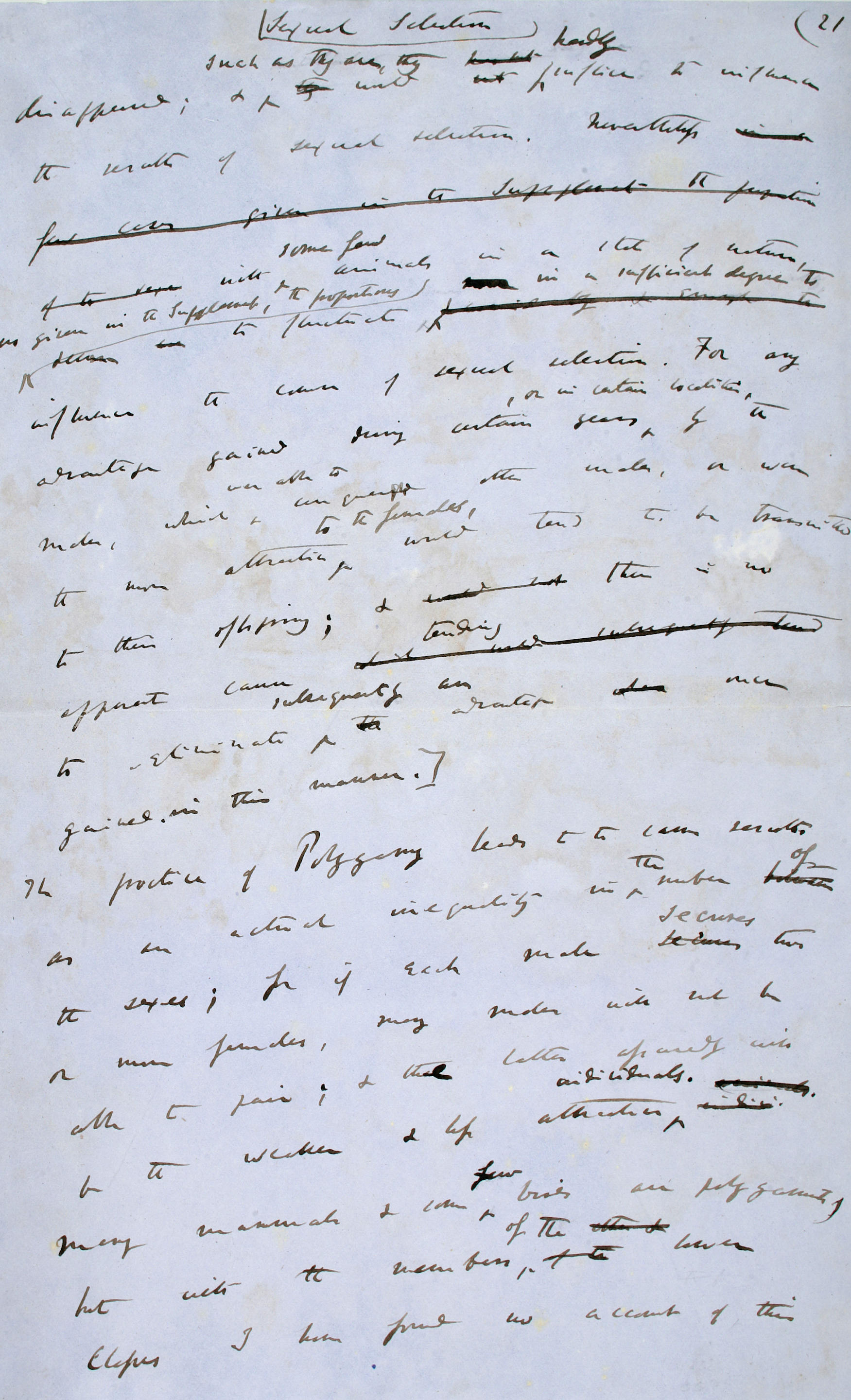DARWIN, Charles (1809-1882). Autograph manuscript leaf, numbered '22', from an early draft of The Descent of Man, and Selection in Relation to Sex , headed 'Chapter 1' and beginning 'It has, I think, now been shown that man agrees with the higher animals, especially the Primates, in having some few instincts in common...', n.d. [1867 - 1869], 20 lines including 10 cancellations and 5 insertions, on blue paper, one page, folio (tear at centre fold from right margin), tipped on to a leaf, with a cut signature and a carte-de-visite photograph. Provenance : from the autograph collection of Matilda Blanche Gibbs (d.1887), wife of William Gibbs of Tyntesfield; and by descent. A KEY PASSAGE FROM THE WORK IN WHICH DARWIN FINALLY DEMOLISHED THE TRADITION OF THE CREATION OF MAN IN THE IMAGE OF GOD The passage was intended for his presentation of the most difficult aspect of his case, the mind, arguing that man and the higher animals are all alike in having 'the same senses, intuitions & sensations, similar passions, affections and emotions, even the more complex ones; in feeling wonder & curiosity; in possessing the faculties of imitation, attention, memory, imagination & reason'. The draft breaks off as Darwin lists the mental abilities which other writers regard as uniquely possessed by man ('It has been asserted that no animal except man is capable of progressive improvement ...'). The passage is given, with later revisions, on pages 48-49 of Volume I of The Descent of Man (John Murray 1871), in chapter II which, like the chapter which follows it, is entitled 'Comparison of the Mental Powers of Man and the Lower Animals'. The heading of the draft as 'Chapter I' suggests that it was intended for insertion in the first of these two chapters, and that the first draft lacked the present first chapter of the work, which is entitled 'Evidence of the Descent of Man from some Lower Form', and refers to the similarities of the structure, embryonic development and rudimentary structures of man and the lower animals. In chapter II Darwin sets out to demonstrate that, despite great differences in mental power between man and the lower animals, there is no fundamental difference between man and the higher mammals in their mental faculties, arguing that such differences as there are, are of degree and not of kind. Darwin rests his case upon his observations of the instincts and emotions, and then the more intellectual emotions and 'mental powers' which form the basis for the development of 'higher mental powers'. These include imitation, attention, memory, imagination and reason, and following on from the passage given here, he continues with a discussion of the aptitude of animals for using tools and weapons, and the significance of language, before concluding the chapter with several paragraphs on the development of a belief in God. The process of natural selection described in the Origin of Species (1859), which opened a new era in biology, destroyed the credibility of the tradition of creation as the benevolent design of God, and with it much of the argument for the existence of God. In it Darwin had implied, but not specifically said, that man was a cousin to the ape. This extension of his theory was fully explained only in The Descent of Man on which he began work late in 1867, including in it his theories on ape ancestors, sexual selection and the development of morality and religion. It was the conclusion of nearly thirty years of note-taking and study. Originally conceived as an extra chapter for the Variation of Animals and Plants under Domestication (1868), and then as a small book, The Descent of Man finally appeared in two volumes, each of over 400 pages. It was the work in which for the first time evolution is mentioned ('Introduction', p.2), before its appearance in the 6th edition of the Origin of Species later in 1871. For the final revision of the text Darwin acknowledged the help of his daughter Henrietta, who read it at
DARWIN, Charles (1809-1882). Autograph manuscript leaf, numbered '22', from an early draft of The Descent of Man, and Selection in Relation to Sex , headed 'Chapter 1' and beginning 'It has, I think, now been shown that man agrees with the higher animals, especially the Primates, in having some few instincts in common...', n.d. [1867 - 1869], 20 lines including 10 cancellations and 5 insertions, on blue paper, one page, folio (tear at centre fold from right margin), tipped on to a leaf, with a cut signature and a carte-de-visite photograph. Provenance : from the autograph collection of Matilda Blanche Gibbs (d.1887), wife of William Gibbs of Tyntesfield; and by descent. A KEY PASSAGE FROM THE WORK IN WHICH DARWIN FINALLY DEMOLISHED THE TRADITION OF THE CREATION OF MAN IN THE IMAGE OF GOD The passage was intended for his presentation of the most difficult aspect of his case, the mind, arguing that man and the higher animals are all alike in having 'the same senses, intuitions & sensations, similar passions, affections and emotions, even the more complex ones; in feeling wonder & curiosity; in possessing the faculties of imitation, attention, memory, imagination & reason'. The draft breaks off as Darwin lists the mental abilities which other writers regard as uniquely possessed by man ('It has been asserted that no animal except man is capable of progressive improvement ...'). The passage is given, with later revisions, on pages 48-49 of Volume I of The Descent of Man (John Murray 1871), in chapter II which, like the chapter which follows it, is entitled 'Comparison of the Mental Powers of Man and the Lower Animals'. The heading of the draft as 'Chapter I' suggests that it was intended for insertion in the first of these two chapters, and that the first draft lacked the present first chapter of the work, which is entitled 'Evidence of the Descent of Man from some Lower Form', and refers to the similarities of the structure, embryonic development and rudimentary structures of man and the lower animals. In chapter II Darwin sets out to demonstrate that, despite great differences in mental power between man and the lower animals, there is no fundamental difference between man and the higher mammals in their mental faculties, arguing that such differences as there are, are of degree and not of kind. Darwin rests his case upon his observations of the instincts and emotions, and then the more intellectual emotions and 'mental powers' which form the basis for the development of 'higher mental powers'. These include imitation, attention, memory, imagination and reason, and following on from the passage given here, he continues with a discussion of the aptitude of animals for using tools and weapons, and the significance of language, before concluding the chapter with several paragraphs on the development of a belief in God. The process of natural selection described in the Origin of Species (1859), which opened a new era in biology, destroyed the credibility of the tradition of creation as the benevolent design of God, and with it much of the argument for the existence of God. In it Darwin had implied, but not specifically said, that man was a cousin to the ape. This extension of his theory was fully explained only in The Descent of Man on which he began work late in 1867, including in it his theories on ape ancestors, sexual selection and the development of morality and religion. It was the conclusion of nearly thirty years of note-taking and study. Originally conceived as an extra chapter for the Variation of Animals and Plants under Domestication (1868), and then as a small book, The Descent of Man finally appeared in two volumes, each of over 400 pages. It was the work in which for the first time evolution is mentioned ('Introduction', p.2), before its appearance in the 6th edition of the Origin of Species later in 1871. For the final revision of the text Darwin acknowledged the help of his daughter Henrietta, who read it at

.jpg)
.jpg)

.jpg)


.jpg)
.jpg)



Testen Sie LotSearch und seine Premium-Features 7 Tage - ohne Kosten!
Lassen Sie sich automatisch über neue Objekte in kommenden Auktionen benachrichtigen.
Suchauftrag anlegen